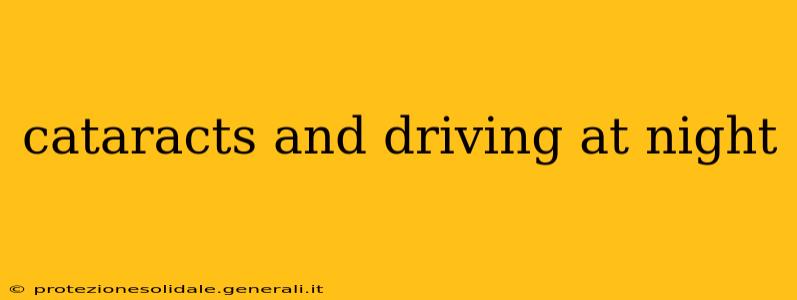Cataracts, a clouding of the eye's lens, significantly impact vision, and the challenges are often amplified at night. Driving at night with cataracts can be dangerous, demanding careful consideration and potentially necessitating adjustments to driving habits or even ceasing night driving altogether. This post will delve into the specific issues faced by individuals with cataracts when driving at night and provide strategies for managing those challenges.
How Do Cataracts Affect Night Driving?
Cataracts scatter light entering the eye, resulting in reduced visual acuity, particularly in low-light conditions. This scattering effect leads to several problems for drivers:
- Glare Sensitivity: Headlights from oncoming vehicles or streetlights can appear excessively bright and cause significant discomfort and temporary blindness. This glare makes it difficult to see the road ahead clearly and safely.
- Reduced Contrast Sensitivity: Differentiating between objects with similar brightness levels (like a dark car against a dark background) becomes more difficult, increasing the risk of accidents.
- Halos and Starbursts: Bright lights can appear surrounded by halos or starbursts, further distorting vision and hindering safe navigation.
- Difficulty Seeing in Shadows: The reduced clarity makes it harder to identify pedestrians, cyclists, and animals in poorly lit areas.
- Increased Night Blindness: Cataracts can exacerbate existing night blindness, making even familiar routes treacherous.
What are the Risks of Driving at Night with Cataracts?
The combination of reduced visibility and impaired judgment poses significant risks:
- Increased Accident Risk: The difficulties listed above dramatically increase the chance of collisions with other vehicles, pedestrians, or objects.
- Delayed Reaction Times: The time it takes to react to unexpected situations is prolonged due to the slowed visual processing.
- Reduced Peripheral Vision: Cataracts can also affect peripheral vision, narrowing the field of vision and limiting awareness of surroundings.
- Impaired Depth Perception: Judging distances accurately becomes challenging, which is crucial for safe driving.
Is it Safe to Drive at Night with Cataracts?
The safety of night driving with cataracts varies greatly depending on the severity of the cataract and the individual's ability to compensate. Some individuals might manage with minor adjustments, while others might need to avoid night driving entirely. It's crucial to prioritize safety and consult an ophthalmologist. They can assess the extent of vision impairment and advise on whether night driving is safe.
How Can I Improve Night Driving with Cataracts?
While cataract surgery is the definitive solution, some strategies can help manage the challenges temporarily:
- Adjust Driving Habits: Avoid driving at night altogether, especially on unfamiliar roads or in heavy traffic. Drive only when visibility is optimal and reduce speed.
- Use Anti-Glare Glasses or Visors: These can help reduce the intensity of oncoming headlights and improve comfort.
- Keep Windshield Clean: A clean windshield improves visibility and reduces glare.
- Regular Eye Exams: Frequent checkups allow for early detection of any worsening of the cataracts.
- Increased Lighting: Utilizing brighter interior car lighting can increase visibility and improve perception of the road.
What is Cataract Surgery?
Cataract surgery is a safe and effective procedure to remove the clouded lens and replace it with an artificial intraocular lens (IOL). This surgery significantly improves vision and resolves many of the challenges associated with night driving.
Will Cataract Surgery Improve My Night Vision?
Yes, cataract surgery is highly effective in improving night vision. After surgery, many patients report a significant reduction in glare, improved contrast sensitivity, and better overall vision in low-light conditions.
When Should I Stop Driving at Night?
If you experience any discomfort, difficulty seeing, or increased anxiety while driving at night with cataracts, it’s crucial to stop driving at night and consult with your ophthalmologist. Your safety and the safety of others should always come first.
Disclaimer: This information is for educational purposes only and does not constitute medical advice. Always consult with your ophthalmologist or healthcare provider for any concerns about your vision and driving safety.
